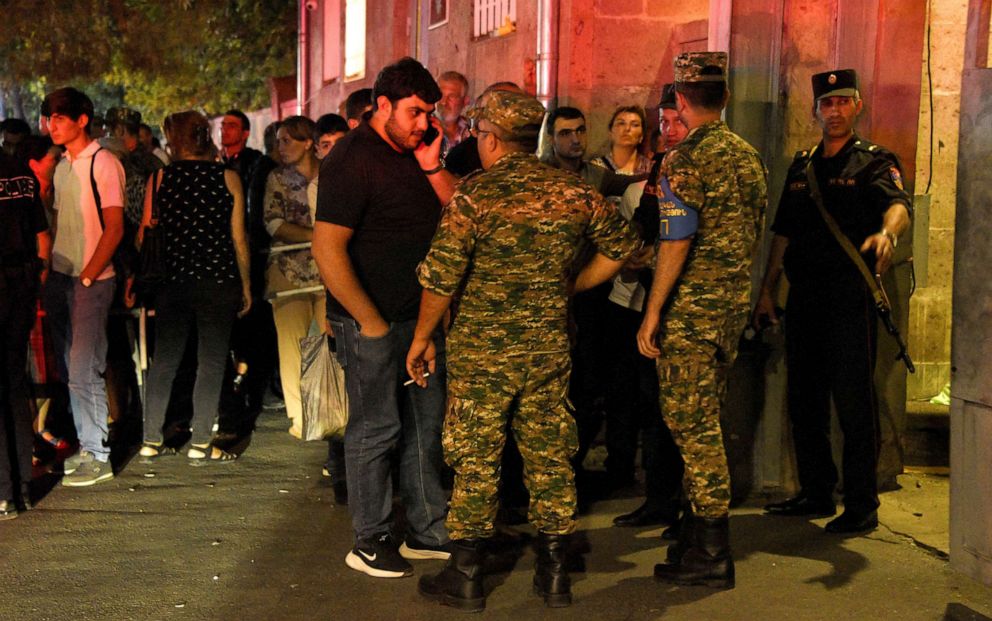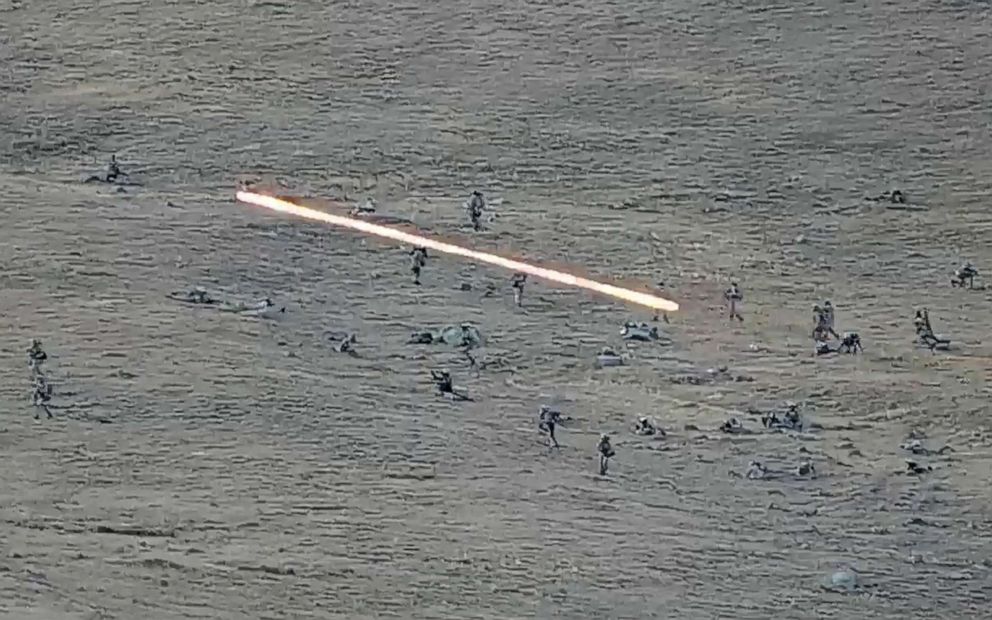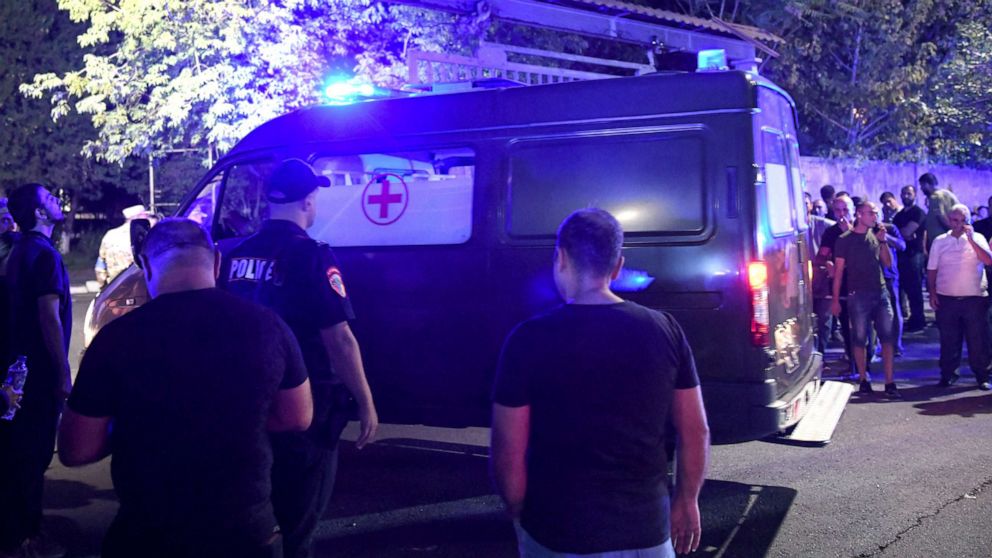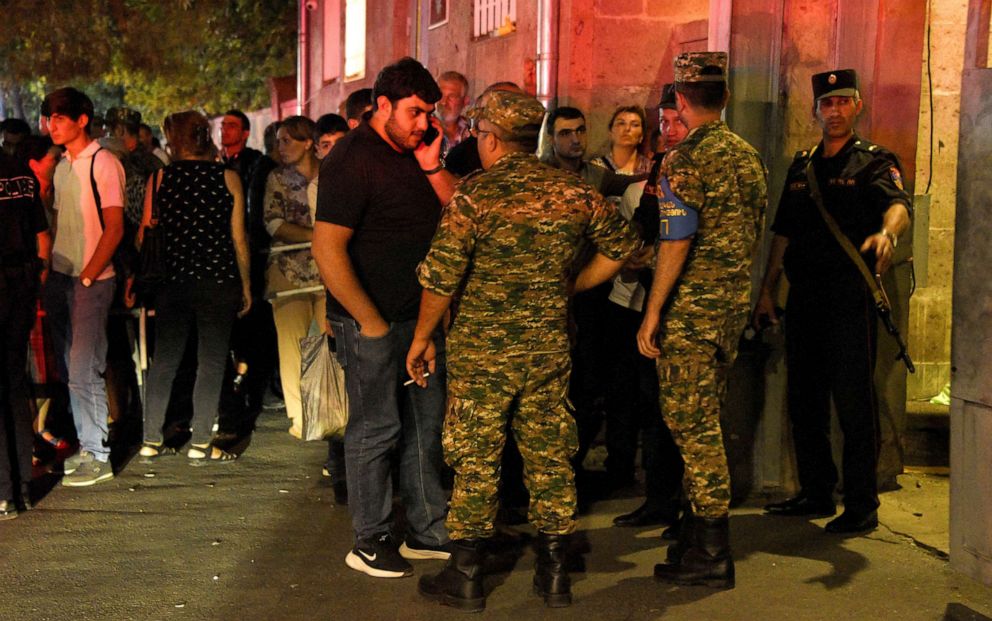Heavy fighting has broken out between Azerbaijan and Armenia after Azerbaijan appeared to launch a large-scale attack on Armenian territory, triggering a crisis that poses a potentially serious challenge for Russian President Vladimir Putin.
Armenia accused Azerbaijan of using heavy artillery, mortars and drones to target its troops, as well as towns along its border with the disputed enclave Nagorno-Karabakh starting in the early hours on Tuesday, alleging that at least 49 Armenian troops were killed.
Both sides have blamed each other for the fighting, with Azerbaijan accusing Armenia of launching a “large-scale provocation.”

Relatives of servicemen, who were wounded in night border clashes between Armenia and Azerbaijan, gather outside a military hospital in Yerevan, Sept. 13, 2022.
Karen Minasyan/AFP via Getty Images
Russia said it had brokered a cease-fire to halt the violence on Tuesday night, but Armenia said some fighting was still going on, though less intensely. Both sides accused the other’s forces of firing artillery along the border on Tuesday night.
The fighting is the worst since the two nations waged a bloody war in 2020, in which tens of thousands of civilians were displaced and thousands of troops killed, after Azerbaijan launched an offensive to retake the enclave that is the object of a decades-long conflict.
That war ended with a Russian-brokered cease-fire, after Azerbaijan defeated Armenia and forced it to cede substantial parts of Nagorno-Karabakh. Russia is in a security alliance with Armenia and deployed hundreds of troops there as peace-keepers to police the deal and enforce the lines separating the sides in the enclave.
But with Russia now struggling in Ukraine, Azerbaijan may be seeking to take advantage of Moscow’s difficulties to force Armenia to make further concessions.
Armenia has accused Azerbaijan of firing on several towns and villages in its border area since Monday, releasing video purporting to show dozens of Azerbaijani troops trying to advance. Azerbaijan claimed its forces began firing after its infrastructure came under fire first, alleging Armenian military movements in the past month suggest preparations for a “large-scale military provocation.” Armenia said the claims may be intended as a pretext for military action.
Armenian Prime Minister Nikol Pashinian has appealed to Russia and a Moscow-led security bloc of former Soviet countries to come to its aid, triggered a mutual assistance pact. Pashinian on Tuesday spoke by phone with Russia’s defense minister, Sergey Shoigu, during which they agreed to “take the necessary steps in the direction of stabilizing the situation,” according to Armenia’s defense ministry.
The crisis is a challenge for the Kremlin, coming as it is reels from Ukraine’s spectacular counteroffensive that routed Russian forces in its northeast this week and when Russia does not have the troops to spare for a major intervention. The collapse of the deal would embarrass Russia and undermine its position as the preeminent powerbroker in the region.

In this image taken from a YouTube footage released by Armenian Defense Ministry on shows Azerbaijanian servicemen crossing the Armenian-Azerbaijani border and approaching the Armenian positions, Sept. 13, 2022.
Armenian Defense Ministry via AP
Russia’s foreign ministry has expressed “extreme concern” over the fighting and urged both sides to refrain from further escalation. The Kremlin’s spokesman Dmitry Peskov said Russia was carrying out “intensive work” to resolve the situation and that Putin was personally involved.
The Collective Security Treaty Organization, the Moscow-led security bloc that Armenia appealed to, held an emergency session in response Tuesday. The bloc agreed its secretary general should visit the conflict zone and a working group should be set up to study the situation, Belarus’ presidential press office told the Russian news service, Interfax.

An ambulance arrives at a military hospital as wounded personnel receive medical treatment after armed clashes between Armenia and Azerbaijan outside Nagorno-Karabakh overnight, Sept. 13, 2022.
Alexander Patrin/TASS via Zumapress
The United States and the European Union have also called for an urgent end to the fighting. Secretary of State Antony Blinken said he had spoken to both Pashinian and Azerbaijan’s President Ilhar Aliyev by telephone Tuesday, calling on both to pull back from further conflict.
Blinken told reporters that it would be positive if Russia is able to help stop the violence.
“If Russia can actually use its own influence, for good which is to again, calm the waters, end the violence, and urge people to engage in good faith on building peace, that would be a positive thing,” Blinken said during a visit to Purdue University in Indiana.




